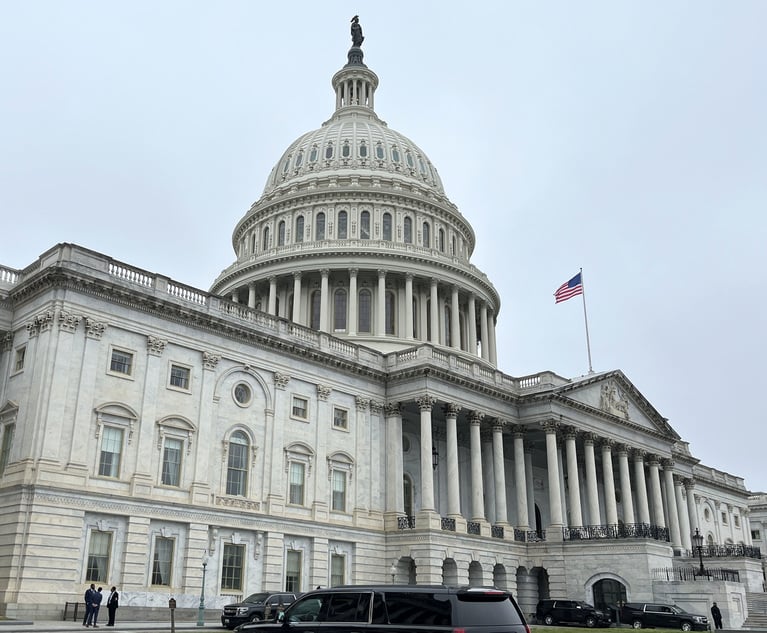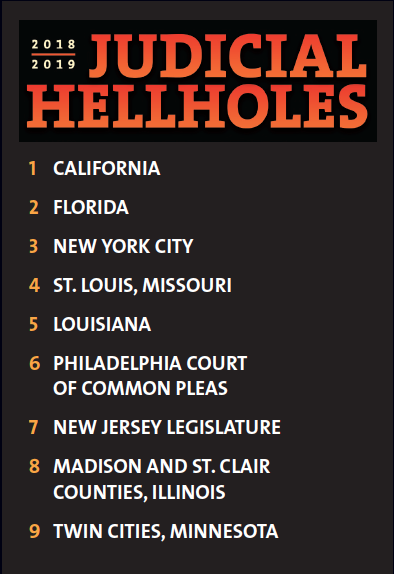Philadelphia Still a 'Judicial Hellhole,' Pa. Supreme Court Potentially Hellish, Report Says
The Philadelphia Court of Common Pleas has once again made the American Tort Reform Association's annual “Judicial Hellholes” list, while the Pennsylvania Supreme Court has been placed on the watch list for prospective hellholes.
December 04, 2018 at 07:10 PM
9 minute read
The original version of this story was published on Law.com
 Credit: PrasongTakham/Shutterstock.com.
Credit: PrasongTakham/Shutterstock.com.
The Philadelphia Court of Common Pleas has once again made the American Tort Reform Association's annual “Judicial Hellholes” list, while the Pennsylvania Supreme Court has been placed on the watch list for prospective hellholes.
The 2018-2019 “Judicial Hellholes,” published by ATRA, a defense bar organization, ranked the nation's top nine venues with the “most unfair” legal systems.
Last year, Philadelphia Common Pleas Court ranked fifth, reappearing on the list after a six-year absence. This year, it dropped one spot to No. 6, though that does not appear to signal that ATRA has softened its view of the court.
“Mass tort cases continue to flood the Philadelphia court system due to judges' loose application of venue laws and an overall lack of legal reform,” the report said. “Philadelphia also remains a hotbed for asbestos litigation. State leadership appears to be strongly aligned with the plaintiffs' bar, signaling little hope for change.”
This year, ATRA's ire was directed mostly toward the Complex Litigation Center, largely because of the pharmaceutical litigation pending there, 84 percent of which was filed by out-of-state plaintiffs, according to the report.
The report called that figure “baffling” in light of the U.S. Supreme Court's 2017 landmark ruling in Bristol-Myers Squibb v. Superior Court of California, which held that, in order for a defendant to be subject to specific jurisdiction, there must be a connection between the forum where the suit was filed and the underlying controversy.
“While widely considered to be a 'game changer' for the defense bar, the decision seems to have fallen on deaf ears in Pennsylvania,” the report said. ”The Philadelphia Court of Common Pleas is a magnet for mass tort claims from all over the country, and judges have allowed forum-shopping to continue in other types of litigation as well.”
While the Philadelphia Court of Common Pleas was singled out in the main ranking, the report also cited the Pennsylvania Supreme Court as a potential “hellhole” to watch.
“The high court issued a series of liability expanding decisions and has been selective, at best, in following U.S. Supreme Court precedent, inexplicably opening its doors to out-of-state plaintiffs,” the report said.
In a statement, Curt Schroder, executive director of the Pennsylvania Coalition for Civil Justice Reform, said Pennsylvania's plaintiff-friendly climate invites “litigation tourism” and repels business and commerce.
“If Pennsylvania truly wants to attract marquee employers, having just lost its bid for Amazon, Philadelphia needs to get off this list,” Schroder said. ”Neither the city nor the state will ever catch a big-name company or significantly grow its jobs climate until Pennsylvania improves its judicial footing and cleans up its liability climate.”
But Timothy Lawn, a plaintiffs lawyer with Raynes Lawn Hehmeyer in Philadelphia and the president of the Philadelphia Trial Lawyers Association, said the ATRA report's findings are “fake news as far as I'm concerned.”
“My position is that this is essentially funded by Fortune 500 companies, liability insurance companies, pharmaceutical and tobacco companies, and they don't like being held accountable when they injure folks,” Lawn said.
Joshua Geist, a plaintiffs lawyer with Goodrich & Geist in Pittsburgh and president of the Pennsylvania Association for Justice, had a similar take in his own statement.
“Let me be clear—this is not a report,” Geist said in an email. ”It is an annual illegitimate PR stunt, not grounded in fact or measured data, self-authored by corporations and insurance companies who want to limit access and justice for people who are injured by their wrongdoings. People who live in these identified cities and states, referred to as 'hellholes,' should be comforted to know that their constitutional rights are protected should they ever be wronged, injured, or killed.”
Asked for a response to those comments, a spokeswoman for ATRA said in an email Wednesday, “Philadelphia is a hotbed for what we call 'litigation tourism' because personal injury lawyers believe that it gives them the best possible chance for an outsized award despite the fact that many of their clients have nothing to do with the city. In fact, in the Philadelphia Court of Common Pleas, 84 percent of claimants against pharmaceutical makers are from out-of-state. This is unfair to hardworking taxpayers whose local courts get backed up with cases that have nothing to do with Philadelphia. We urge those judges to enforce reasonable venue rules that put the interests of local citizens first.”
Other 'Hellholes'
California, which has topped the list at least three prior times, was ranked No. 1 again this year. Last year's report bumped it to No. 2 in favor of Florida, whose highest court came out with a bevy of medical malpractice decisions for plaintiffs. This year, Florida ranked No. 2.
California's top ranking comes after the state's highest court became the first in the nation to hold manufacturers of brand-name pharmaceuticals liable in cases involving their generic equivalents.
“That was such an outlier,” said Sherman “Tiger” Joyce, ATRA's president. “There was a sense that what was going on in California collectively was enough to rule it beyond Florida, and there was not the level of negative activity in Florida.”
New York City's courts jumped to No. 3, while the Philadelphia Court of Common Pleas and New Jersey's legislature, though not its courts, also made the list.
Some overriding concerns in the report involved: the prevalence of “junk science” at trials; class actions, particularly involving food packaging, which the defense bar insists have no injuries; and “activist” attorneys general who have brought cases over opioids and climate change.
Peter Knudsen, a spokesman for the American Association for Justice, the nation's largest plaintiffs bar, said of the report: “ATRA's definition of a 'hellhole' is a courtroom where a plaintiff brings a case in front of a jury to hold an unscrupulous corporation accountable. The real hellhole is a world in which an unsuspecting consumer is harmed, abused or defrauded by an unscrupulous corporation but has no recourse and no chance to prevent future wrongdoing.”
California has been No. 1 in prior years, often cited for its unique laws, like this year's data privacy statute. But the California Supreme Court's Dec. 21 decision last year in T.H. v. Novartis Pharmaceuticals propelled it to the top of the list again. The ruling was the first to impose liability on brand-name drugmakers for the actions of generic pharmaceutical manufacturers, which the U.S. Supreme Court found in 2011 were protected from tort actions by federal pre-emption under Pliva v. Mensing.
At least 35 other state and federal courts have rejected the theory, the report says, but since the California ruling, the Massachusetts Supreme Court has adopted innovatory liability.
“The reason the decision matters is for the first time consumers of generic drugs have a remedy when they're injured by a mislabeled drug,” said Leslie Brueckner, senior attorney at Public Justice who represented the plaintiff. “That's what this decision did. And because 90 percent of the drugs in America that are consumed are generic, it's a huge deal in holding the pharmaceutical industry liable for dangerously labeled drugs.”
Florida continued to rank high after the state's highest court refused to adopt the more defense-friendly standard for expert evidence, named for the U.S. Supreme Court's 1993 decision in Daubert v. Merrell Dow Pharmaceuticals, in its DeLisle v. Crane decision this year. But the report said the Florida Supreme Court was “poised to significantly shift” given that incoming Gov. Ron DeSantis, a Republican, would appoint three members of the court.
The report also expanded its ranking of New York City's Asbestos Litigation court to include all courts in New York City. That's primarily because of a growth in class actions brought over food packaging, Joyce said.
New Jersey, ranked No. 6 last year, received mixed reviews this year, with the report claiming it has the “most plaintiff-friendly legislature in the country.”
“For the first time ever, we highlighted not a state for its courts but for its legislature,” Joyce said. “But when you look at the totality of what the New Jersey legislature has done and is poised to do, it's dramatically expanding liability.”
In contrast, the report praised decisions of the New Jersey Supreme Court, such as its ruling enacting the Daubert standard.
Here are a few more highlights from “Judicial Hellholes” report:
- The Twin Cities area of Minnesota joined the list for the first time, at No. 9, because of an $850 million settlement in a groundwater contamination case. The settlement, between Minnesota Attorney General Lori Swanson and against 3M, gave $125 million in contingency fees to outside law firms. The Minnesota Supreme Court also rejected the Daubert standard.
- St. Louis continued to be on the list, at No. 4, down one ranking from last year, due to the legislature's failure to enact tort reform. The report also noted a $4.7 billion verdict against Johnson & Johnson over its baby powder.
- The report put the Georgia Supreme Court on the “watch list” after it upheld a $40 million verdict in Chrysler Group LLC v. Walden this year.
- The Delaware Supreme Court got a “dishonorable mention” for its “take-home” asbestos ruling, and Texas trial courts for their large verdicts, such as a $706.2 million trade secret verdict against a Quicken Loans affiliate.
- The report gave kudos—called “Points of Light”—to the U.S. Supreme Court for its decision this year upholding class action waivers in employment contracts, and to the U.S. Court of Appeals for the Fifth Circuit for its reversal of a $502 million verdict over hip implants.
This content has been archived. It is available through our partners, LexisNexis® and Bloomberg Law.
To view this content, please continue to their sites.
Not a Lexis Subscriber?
Subscribe Now
Not a Bloomberg Law Subscriber?
Subscribe Now
NOT FOR REPRINT
© 2025 ALM Global, LLC, All Rights Reserved. Request academic re-use from www.copyright.com. All other uses, submit a request to [email protected]. For more information visit Asset & Logo Licensing.
You Might Like
View All
Report: Firms Should Focus on Collections to Prepare for Uncertain 2025
6 minute read
'Issues That Have to Be Addressed': New Study Finds Flaws in Reporting Federal Judicial Sexual Misconduct
6 minute read

Mothers Still Face Disproportionate Burden in Legal Field, ABA Report Finds
6 minute readTrending Stories
- 1Bribery Case Against Former Lt. Gov. Brian Benjamin Is Dropped
- 2‘Extremely Disturbing’: AI Firms Face Class Action by ‘Taskers’ Exposed to Traumatic Content
- 3State Appeals Court Revives BraunHagey Lawsuit Alleging $4.2M Unlawful Wire to China
- 4Invoking Trump, AG Bonta Reminds Lawyers of Duties to Noncitizens in Plea Dealing
- 522-Count Indictment Is Just the Start of SCOTUSBlog Atty's Legal Problems, Experts Say
Who Got The Work
J. Brugh Lower of Gibbons has entered an appearance for industrial equipment supplier Devco Corporation in a pending trademark infringement lawsuit. The suit, accusing the defendant of selling knock-off Graco products, was filed Dec. 18 in New Jersey District Court by Rivkin Radler on behalf of Graco Inc. and Graco Minnesota. The case, assigned to U.S. District Judge Zahid N. Quraishi, is 3:24-cv-11294, Graco Inc. et al v. Devco Corporation.
Who Got The Work
Rebecca Maller-Stein and Kent A. Yalowitz of Arnold & Porter Kaye Scholer have entered their appearances for Hanaco Venture Capital and its executives, Lior Prosor and David Frankel, in a pending securities lawsuit. The action, filed on Dec. 24 in New York Southern District Court by Zell, Aron & Co. on behalf of Goldeneye Advisors, accuses the defendants of negligently and fraudulently managing the plaintiff's $1 million investment. The case, assigned to U.S. District Judge Vernon S. Broderick, is 1:24-cv-09918, Goldeneye Advisors, LLC v. Hanaco Venture Capital, Ltd. et al.
Who Got The Work
Attorneys from A&O Shearman has stepped in as defense counsel for Toronto-Dominion Bank and other defendants in a pending securities class action. The suit, filed Dec. 11 in New York Southern District Court by Bleichmar Fonti & Auld, accuses the defendants of concealing the bank's 'pervasive' deficiencies in regards to its compliance with the Bank Secrecy Act and the quality of its anti-money laundering controls. The case, assigned to U.S. District Judge Arun Subramanian, is 1:24-cv-09445, Gonzalez v. The Toronto-Dominion Bank et al.
Who Got The Work
Crown Castle International, a Pennsylvania company providing shared communications infrastructure, has turned to Luke D. Wolf of Gordon Rees Scully Mansukhani to fend off a pending breach-of-contract lawsuit. The court action, filed Nov. 25 in Michigan Eastern District Court by Hooper Hathaway PC on behalf of The Town Residences LLC, accuses Crown Castle of failing to transfer approximately $30,000 in utility payments from T-Mobile in breach of a roof-top lease and assignment agreement. The case, assigned to U.S. District Judge Susan K. Declercq, is 2:24-cv-13131, The Town Residences LLC v. T-Mobile US, Inc. et al.
Who Got The Work
Wilfred P. Coronato and Daniel M. Schwartz of McCarter & English have stepped in as defense counsel to Electrolux Home Products Inc. in a pending product liability lawsuit. The court action, filed Nov. 26 in New York Eastern District Court by Poulos Lopiccolo PC and Nagel Rice LLP on behalf of David Stern, alleges that the defendant's refrigerators’ drawers and shelving repeatedly break and fall apart within months after purchase. The case, assigned to U.S. District Judge Joan M. Azrack, is 2:24-cv-08204, Stern v. Electrolux Home Products, Inc.
Featured Firms
Law Offices of Gary Martin Hays & Associates, P.C.
(470) 294-1674
Law Offices of Mark E. Salomone
(857) 444-6468
Smith & Hassler
(713) 739-1250






